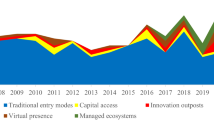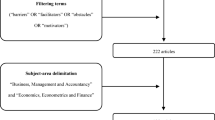Abstract
A wealth of research in the past decades has examined born globals or international new ventures, which are firms that from inception view the whole world as a market and as a source to access resources. Many of these firms build their competitive advantage on high-tech knowledge. However, although many studies have shown how born globals can achieve success if they access resources through their relationships from actors in their networks, few studies have explored the relationship between born globals and universities. Universities are important actors in creating new technology knowledge, and many studies have shown how new firms, or so-called university spin-offs (USOs), are formed around universities. The current study explores why some USOs are successful in their international growth strategy and discusses the factors that influence and facilitate the internationalization process. The study investigates 10 USOs around the newly established Halmstad University in Sweden and finds that universities have a positive effect on firm creation and initial international growth. The regional competence base increases from the establishment of a local university, primarily by strengthening the regional human capital and by increasing university research. This study shows that researcher entrepreneurs’ ventures start as born globals, but that these firms do not continue to grow. Born global business models, per se, do not lead to competitive advantage and successful internationalization. Instead, a strategy built on customer focus and an ability to adapt to different customer demands lead to growth, and the location of growth is dependent on the size of the home market. This study also shows that student entrepreneurship can be a successful growth strategy for USOs focusing on both international and local markets.
Eine Menge von Forschung in den letzten Jahrzehnten haben “Born Globals” oder “International New Ventures” untersucht, das heisst Firmen, die von Anfang an die ganze Welt als ein Markt und als eine Quelle zu Zugang zu Ressourcen sehen. Viele dieser Firmen bauen ihre Wettbewerbsvorteile auf High-Tech-Wissen. Allerdings, obwohl viele Studien gezeigt haben, wie Born Globals Erfolg erzielen können, wenn sie Zugang zu Ressourcen durch ihre Beziehungen mit Akteuren in ihren Netzwerken suchen, wenige Studien haben die Beziehung zwischen Born Globals und Universitäten erforscht. Universitäten sind wichtige Akteure bei der Erzeugung der neuen Technologie Wissen, und viele Studien haben gezeigt, wie neue Firmen, oder so genannte Universitäts-Spin-offs (USOs) im Umfeld von Universitäten gebildet werden. Die aktuelle Studie untersucht warum einige USOs in ihrer internationalen Wachstumsstrategie erfolgreich sind, und diskutiert die Faktoren, die den Process der Internationalisierung beeinflussen und erleichtern. Die Studie untersucht 10 USOs in Umgebung der neu gegründeten Universität Halmstad in Schweden und stellt fest, dass Universitäten eine positive Wirkung auf Firmengründungen und das Initial des internationale Wachstums. Die regionale Kompetenzbasis nimmt von der Einrichtung einer örtlichen Universität zu, in erster Linie durch die regionale Stärkung des Humankapitals und durch Erhöhung der universitären Forschung. Diese Studie zeigt, dass Ventures der Forscher Unternehmer fangen als Born Globals an, aber dass diese Unternehmen nicht zu wachsen fortsetzen. Born Globale Geschäftsmodelle (oder Unternehmungsmodelle), per se, führen nicht zu Wettbewerbsvorteil und erfolgreiche Internationalisierung. Stattdessen wird eine Strategie für die Kundenorientierung und die Fähigkeit drauf unterschiedliche Kundenanforderungen anzupassen, zu Wachstum führen, und die Lage des Wachstums auf die Größe des Heimatmarktes abhängig ist. Diese Studie zeigt auch, dass Schüler Unternehmertum eine erfolgreiche Wachstumsstrategie für USOs auf beiden internationalen und lokalen Märkten konzentriert sein kann.
Similar content being viewed by others
Notes
The words spin-off and spin-out are used inconsistently among different authors in previous research, but a spin-off is usually connected with the start-up of a new firm, whereas a spin-out focuses on technologies or knowledge transferred from existing organizations (Lindholm Dahlstrand 2004). A spin-out could for example include academic research that is transferred to and commercialized in an already existing firm. Therefore, we use the term spin-off in this article to indicate our focus on new firm creation.
References
Acs ZJ, Braunerhjelm P, Audretsch DB, Carlsson B (2009) The knowledge spillover theory of entrepreneurship. Small Bus Econ 32:15–30
Aldrich HE, Zimmer C (1986) Entrepreneurship through social networks. In: Sexton DL, Wilson RW (eds) The art and science of entrepreneurship. Ballinger, Cambridge, pp 154–167
Andersson S (2000) Internationalization of the firm from an entrepreneurial perspective. Int Stud Manag Organ 30(1):63–92
Andersson S (2006) International growth strategies in consumer and business-to-business markets in manufacturing and service sectors. J Euromarketing 15(4):35–56
Andersson S (2011) International entrepreneurship, born globals and the theory of effectuation. J Small Bus Enterp Dev 18(3):627–643
Andersson S, Evers N, Griot C (2013) Local and international networks in small firm internationalisation: cases from the Rhône-Alpes medical technology regional cluster. Entrep Reg Dev Int J 25(9–10):867–888
Andersson S, Evers N, Kuivalainen O (2014) International new ventures: rapid internationalization across different industry contexts. Eur Bus Rev 26(5):390–405
Andersson S, Wictor I (2003) Innovative internationalisation in new firms—born globals the Swedish Case. J Int Entrep 1(3):249–276
Åstebro T, Bazzazian N, Braguinsky S (2012) Startups by recent university graduates and their faculty: implications for university entrepreneurship policy. Res Policy 41(4):663–677
Audretsch DB, Feldman MP (1996) R&D spillovers and the geography of innovation and production. Am Econ Rev 86(3):630–640
Audretsch DB, Keilbach M (2004) Entrepreneurship capital and economic performance. Reg Stud 38(8):949–959
Audretsch DB, Lehmann EE (2005) Does the knowledge spillover theory of entrepreneurship hold for regions? Res Policy 34:1191–1202
Bathelt H, Malmberg A, Maskell P (2004) Cluster and knowledge: local buzz, global pipelines and the process of knowledge creation. Prog Hum Geogr 28(1):31–56
Bercovitz J, Feldman M (2008) Academic entrepreneurs: organizational change at the individual level. Organ Sci 19(1):69–89
Bergek A, Norrman C (2008) Incubators best practice: a framework. Technovation 28:10–28
Berggren E (2011) The entrepreneurial university’s influence on commercialization of academic research—the illustrative case of Chalmers University of Technology. Int J Entrep Small Bus 12(4):429–444
Berggren E, Lindholm Dahlstrand Å (2009) Creating an entrepreneurial region: two waves of academic spin-offs from Halmstad University. Eur Plan Stud 17(8):1171–1189
Braunerhjelm P (2007) Academic entrepreneurship: social norms, university culture and policies. Sci Public Policy 34(9):619–631
Calza F, Dezi L, Schiavone F, Simoni M (2014) The intellectual capital of business incubators. J Intellect Cap 15(4):597–610
Chiesa V, Picculuga A (2000) Exploitation and diffusion of public research: the case of academic spin-off companies in Italy. R&D Manag 30(4):329–339
Clarysse B, Moray N (2004) A process study of entrepreneurial team formation: the case of a research-based spin-off. J Bus Ventur 19:55–79
Cohen WM, Levinthal DA (1990) Absorptive capacity: a new perspective on learning and innovation. Adm Sci Q 35:128–152
Colombo M, D’Adda D, Piva E (2010) The contribution of university research to the growth of academic start-ups: an empirical analysis. J Technol Transfer 35(1):113–140
Colombo MG, Grilli L (2005) Founders’ human capital and the growth of new technology-based firms: a competence-based view. Res Policy 34:795–816
Colombo MG, Piva E (2005) Academic start-ups and new technology-based firms: a matched pair comparison. 5th Triple Helix Conference, Turin
Cooke P, Huggins R (2003) High technology clustering in Cambridge. In: Amin A, Goglio S, Sforzi F (eds) The institutions of local development. IGU, London, pp 51–74
Coviello N (2006) The network dynamics of international new ventures. J Int Bus Stud 37:713–731
Coviello N, Cox M (2006) The resource dynamics of international new venture networks. J Int Entrep 4:113–132
Cunningham JA, Mangematin V, O’Kane C, O’Reilly P (2015) At the frontiers of scientific advancement: the factors that influence scientists to become or choose to become publicly funded principal investigators. J Technol Transfer. doi:10.1007/s10961-015-9400-4
D’Este P, Perkmann M (2010) Why do academics engage with industry? The entrepreneurial university and individual motivations. J Technol Transfer 3:316–339
Eisenhardt KM (1989) Building theories from case study research. Acad Manage Rev 14(4):532–550
Eisenhardt KM, Graebner ME (2007) Theory building from cases: opportunities and challenges. Acad Manage J 50(1):25–32
Eriksson E-L (1996) Akademiskt företagande—från student till företagare. Licentiate thesis. SIRE/Lund University, Halmstad University, Sweden
Evers N (2011) Why do new ventures intrernationalise? A review of the literature of factors that influence new venture internationalisation. Irish J Manag 30(2):17–46
Evers N, Andersson S, Hannibal M (2012) Stakeholders and marketing capabilities in international new ventures: evidence from Ireland, Sweden and Denmark. J Int Mark 24(4):46–71
Evers N, Cunningham J, Hoholm T (2014) Technology entrepreneurship: bringing innovation to the marketplace. Palgrave-MacMillan, London
Evers N, O’Gorman C (2011) Improvised internationalisation in new ventures: the role of prior knowledge and networks. Entrep Reg Dev 23(7–8):549–574
Gately C, Cunningham J (2014) The contributions and disconnections between writing a business plan and the start-up process for incubator technology entrepreneurs, academic entrepreneurships creating an entrepreneurial ecosystem. Adv Entrep, Firms Emerg Growth 16:197–240
George AL, Bennett A (2004) Case studies and theory development in the social sciences. MIT Press, Cambridge
Gerring J (2007) The mechanismic worldview: thinking inside the box. Br J Political Sci 38:161–179
Giblin M (2011) Managing the global–local dimensions of clusters and the role of lead organisations: the contrasting cases of the software and medical technology clusters in the West of Ireland. Eur Plan Stud 19(1):23–42
Giblin M, Ryan P (2012) Tight clusters or loose networks? The critical role of inward foreign direct investment in cluster creation. Reg Stud 46(2):245–258
Gilbert BA, Audretsch DB, McDougall PP (2004) The emergence of entrepreneurship policy. Small Bus Econ 22:313–323
Gray B, Farminer A (2014) And no birds sing—reviving the romance with international entrepreneurship. J Int entrep 12:115–128
Grimaldi R, Kenney M, Siegel D, Wright M (2011) 30 years after Bayh–Dole: reassessing academic entrepreneurship. Res Policy 40(8):1045–1057
Guerrero M, Urbano D, Cunningham J, Organ D (2014) Entrepreneurial universities in two European regions: a case study comparison. J Technol Transfer 39:415–434
Hall PA (2006) Systematic process analysis: when and how to use it. Eur Manag Rev 3(1):24–31
Hannibal. M (2016, published online) Enacted identities in the university spin-off process—bridging an imaginative gap. J Int Entrep DOI 10.1007/s10843-016-0168-x
Hennart J-F (2014) The accidental internationalists: a theory of born globals. Entrep Theory Pract 38(1):117–135
Johannisson B (2000) Networking and entrepreneurial growth. In: Sexton D, Landström H (eds) The Blackwell handbook of entrepreneurship. Blackwell, Oxford, pp 368–386
Johannisson B (2003) Entrepreneurship as a collective phenomenon. In: Genesca E, Urbano D, Capelleras J, Guallarte C, Vergés J (eds) Creacion de empresas: entrepreneurship. Servei de Publicacions de la Universitat Auto’noma de Barcelona, Barcelona, pp 87–109
Johannisson B, Nilsson A (1989) Community entrepreneurship—networking for local development. Entrep Reg Dev 1(1):3–19
Johansson M (2007) Resource acquisition and relationship in new technology-based firms. University of Oslo, Norway
Johansson M, Jacob M, Hellström T (2005) The strength of strong ties: university spin-offs and the significance of historical relations. J Technol Transfer 30:271–286
Jones MV, Coviello N, Tang YK (2011) International entrepreneurship research (1989–2009): a domain ontology and thematic analysis. J Bus Ventur 26:632–659
Keupp MM, Gassmann O (2009) The past and the future of international entrepreneurship: a review and suggestions for developing the field. J Manage 35(3):600–633
Klofsten M, Jones-Evans D (2000) Comparing academic entrepreneurship in Europe—the case of Sweden and Ireland. Small Bus Econ 14(4):299–309
Knight FH (1921) Risk, uncertainty and profit. Houghton Mifflin, New York
Knight GA, Cavusgil ST (1996) The born global firm: a challenge to traditional internationalization theory. In: Cavusgil ST (ed) Advances in international marketing, vol 8. Elsevier BV, Amsterdam, pp 11–26
Knight GA, Cavusgil ST (2004) Innovation, organizational capabilities, and the born-global firm. J Int Bus Stud 35(4):124–141
Lam A (2010) From Ivory Tower traditionalists’ to entrepreneurial scientists’? Soc Stud Sci 40(2):307–340
Lange JE, Marram E, Jawahar AS, Yong W, Bygrave W (2011) Does an entrepreneurship education have lasting value? A study of careers of 4,000 alumni. Front Entrep Res 31(6):209–224
Laurell H, Andersson S, Achtenhagen L (2013) The importance of industry context for new venture internationalisation: a case study from the life sciences. J Int Entrep 11(4):297–319
Lehto I (2015) International entrepreneurial selling as construction of international opportunities. J Int Entrep DOI 10.1007/s10843-015-0147-7
Leitch CM, Harrison RT (2005) Maximising the potential of university spin-outs: the development of second-order commercialisation activities. R&D Manag 35(3):257–272
Lindelöf P, Löfsten H (2004) Proximity as a resource base for competitive advantage: university-industry links for technology transfer. J Technol Transfer 29(3–4):311–326
Lindholm Dahlstrand Å (2004) Teknikbaserat nyföretagande—Tillväxt och affärsutveckling. Studentlitteratur, Lund
Lindholm Dahlstrand Å, Berggren E (2010) Linking innovation and entrepreneurship in higher education: a study of Swedish schools of entrepreneurship. In: Oakey R, Groen A, Cook G, Sijde P (eds) New technology-based firms in the new millennium, vol 8. Emerald Group, Bingley, pp 35–50
Madsen TK, Servais P (1997) The internationalization of born globals: an evolutionary process? Int Bus Rev 6(6):561–583
Malmberg A, Maskell P (1997) Towards an explanation of regional specialization and industry agglomeration. Eur Plan Stud 5(1):25–42
McDougall P, Oviatt B, Shrader R (2003) A comparison of international and domestic new ventures. J Int Entrep 1(1):59–82
Melén S, Nordman ER (2007) The value of human capital for the networks of born globals. Int J Globalisation Small Bus 2(2):205–219
Miles MB, Huberman AM (1994) Qualitative data analysis: an expanded sourcebook. Sage, Thousand Oaks
Miles MB, Huberman AM, Saldana J (2014) Qualitative data analysis: a method sourcebook, 3rd edn. Sage, Thousand Oaks
Mustar P, Renault M, Colombo MG, Piva E, Fontes M, Lockett A, Wright M, Clarysse B, Moray N (2006) Conceptualizing the heterogeneity of research-based spin-offs: a multi-dimensional taxonomy. Res Policy 35(2):289–308
Nicolaou N, Birley S (2003) Academic networks in a trichotomous categorisation of university spinouts. J Bus Ventur 18(3):333–359
Nummela N, Saarenketo S, Puumalainen K (2004) Global mindset–a prerequisite for successful internationalisation? Can J Adm Sci 21(1):51–64
Oviatt BM, McDougall PP (1994) Toward a theory of international new ventures. J Int Bus Stud 25(1):45–64
Perkmann M, Tartari V, McKelvey M, Autio E, Broström A, D’Este P, Fini R, Geuna A, Grimaldi R, Hughes A, Krabel S, Kitson M, Llerena P, Lissoni F, Salter A, Sobrero M (2013) Academic engagement and commercialisation: a review of the literature on university-industry relations. Res Policy 42:423–442
Pirnay F, Surlemont B, Nlemvo F (2003) Towards a typology of university spin-offs. Small Bus Econ 21(4):355–369
Pitkänen I, Parvinen P, Töytäri P (2014) The significance of the new venture’s first sale: the impact of founders’ capabilities and proactive sales orientation. J Prod Innov Manag 31:680–694
Porter ME (1990) The competitive advantage of nations. Macmillan, London
Porter ME (1998) Clusters and competition: new agendas for companies, governments and institutions. In: Porter ME (ed) On competition. Harvard Business School Publishing, BostonMA, pp 197–287
Rasmussen E, Moen Ö, Gulbrandsen M (2006) Initiatives to promote commercialization of university knowledge. Technovation 26(4):518–533
Rialp A, Rialp J, Knight GA (2005) The phenomenon of early internationalizing firms: what do we know after a decade (1993–2003) of scientific inquiry. Int Bus Rev 14(2):147–166
Roberts EB, Eesley C (2011) Entrepreneurial impact: the role of MIT—an updated report. Found Trends Entrep 7(1–2):2011
Rothaermel F, Agung S, Jiang L (2007) University entrepreneurship: a taxonomy of the literature. Ind Corp Chang 16(4):691–791
Sarasvathy SD (2001) Causation and effectuation: toward a theoretical shift from economic inevitability to entrepreneurial contingency”. Acad Manage Rev 26(2):243–63
Shane S (2004) Academic entrepreneurship: university spinoffs and wealth creation. Edward Elgar, Cheltenham
Shane S (2005) Government policies to encourage economic development through entrepreneurship: the case of technology transfer. In: Shane S (ed) Economic development through entrepreneurship. Edward Elgar, Cheltenham, pp 33–49
Siegel DS, Veugelers R, Wright M (2007) ‘Technology transfer offices and commercialization of university intellectual property: performance and policy implications’. Oxf Rev Econ Policy 23:640–60
Svensson G, Payan JM (2009) Organizations that are international from inception. J Small Bus Enterp Dev 16(3):406–417
Styles C, Genua T (2008) The rapid internationalization of high technology firms created through the commercialization of academic research. J World Bus 43:146–157
Teece DJ (2010) Business models, business strategy and innovation. Long Range Plann 43:172–194
Teixeira AAC, Coimbra C (2014) The determinants of the internationalization speed of Portuguese university spin-offs: an empirical investigation. J int Entrep 12(3)
Ulvenblad P, Berggren E, Winborg J (2013) The role of entrepreneurship education and start-up experience for handling of communication and liability of newness. Int J Entrep Behav Res 19(2):187–209
Vanaelst I, Clarysse B, Wright M, Lockett A, Moray N, S’Jegers R (2006) Entrepreneurial team development in academic spinouts: an examination of team heterogeneity. Entrep Theory Pract 30(2):249–271
Volkmann C (2009) Entrepreneurship in higher education. In: Educating the next wave of entrepreneurs). World Economic Forum, Switzerland, pp 42–79
Von Hippel E (1988) The sources of innovation. Oxford, Oxford University Press, New York
Von Hippel E, Thomke S, Sonnack M (1999) Creating breakthroughs at 3M. Harv Bus Rev 77:47–57
Wallin M (2012) The bibliometric structure of spin-off literature. Innovation Manag Policy Pract 14(2):162–177
Wallmark T (1997) Inventions and patents at universities: the case of Chalmers University of technology. Technovation 17(3):127–139
Walter A, Auer M, Ritter T (2006) The impact of network capabilities and entrepreneurial orientation on university spin-off performance. J Bus Ventur 21:541–546
Welch C, Piekkari R, Plakoyiannaki E, Paavilainen- Mäntymäki E (2011) Theorising from case studies: towards a pluralist future for international business research. J Int Bus Stud 42:740–762
Wennberg K, Wiklund J, Wright M (2011) The effectiveness of university knowledge spillovers: performance differences between university spinoffs and corporate spinoffs. Res Policy 40(8):1128–1143
Westhead P, Wright M (1998) Novice, portfolio, and serial founders: are they different? J Bus Ventur 13:173–204
Witt P (2004) Entrepreneurs’ networks and the success of start-ups. Entrep Reg Dev 16(5):391–412
Yin RK (1994) Case study research—design and methods. Sage Publications, London
Acknowledgment
The authors thank the KK foundation and the Swedish Research Council for financial support.
Author information
Authors and Affiliations
Corresponding author
Rights and permissions
About this article
Cite this article
Andersson, S., Berggren, E. Born global or local? Factors influencing the internationalization of university spin-offs—the case of Halmstad University. J Int Entrep 14, 296–322 (2016). https://doi.org/10.1007/s10843-016-0182-z
Published:
Issue Date:
DOI: https://doi.org/10.1007/s10843-016-0182-z
Keywords
- International entrepreneurship
- Academic entrepreneurship
- Born globals
- University spin-offs
- Student entrepreneurs
- International new ventures




